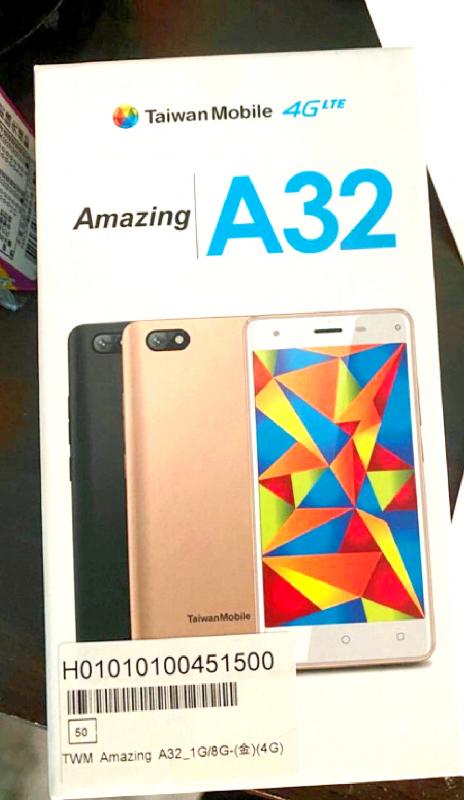The National Communications Commission (NCC) yesterday ordered Taiwan Mobile to recall all of its self-branded, China-made smartphones after the phones’ built-in software was found to contain a malicious program exploitable by scammers.
The telecom in April 2018 launched the Amazing A32 smartphone, which was manufactured in China, to encourage 3G users to upgrade to 4G, the commission said.
The phone cost NT$1,990 (US$70 at the current exchange rate).

Photo courtesy of the National Communications Commission
The telecom sold about 90,000 units of the model before it stopped offering them in July last year, NCC data showed.
As of Dec. 20, about 7,600 Taiwan Mobile subscribers were still using the smartphone, while the remainder of the buyers had migrated to other carriers or bought new smartphones, the commission said.
The Criminal Investigation Bureau last year informed the ministry of the information security breach, NCC Deputy Chairman Wong Po-tsung (翁柏宗) said, adding that the commission had also received five complaints from service subscribers.
The bureau’s investigation found that the implanted program enabled scammers to obtain subscribers’ phone numbers, which they then used to open accounts for mobile game apps.
The apps would send the Taiwan Mobile subscribers a text message with a verification code, which the malicious program would also send to the scammers.
After the scammers finished registering on the mobile game apps, the text message would be automatically deleted from the subscribers’ phones. All of this would proceed without the subscribers’ knowledge.
The company should recall the smartphones “as soon as possible,” Wong said, without specifying a time frame.
The recall would allow subscribers to request a software update or a partial refund, Wong added.
Taiwan Mobile has set up a customer service hotline (0809-000-852) to answer questions from all Amazing A32 users, including those who have switched to other carriers.
Failure to address the problem could constitute a breach of the Telecommunications Management Act (電信管理法) and the telecom could face a fine of up to NT$1 million, Wong said, adding that the company could be fined until the issue is resolved.
To protect people from information security breaches on mobile phones manufactured in China, telecoms can only sell self-branded mobile phones manufactured in China after they obtain information security certification from the Taiwan Association of Information and Communication Standards, he said.
The telecoms must sign an affidavit saying that they would enforce remedial measures to address security breaches caused by preinstalled software on the phones, he added.
The commission would randomly check the top 10 models in Taiwan and mobile phones made in China to ensure that they meet national information security standards, Wong said, adding that telecoms and manufacturers that fail annual inspections would be required to resolve the issues immediately.
The commission already required mobile phone manufacturers to sign an affidavit guaranteeing that phones would not show Taiwan as being part of China after software updates, the ministry said.
Contravening the regulation would keep the commission from certifying a smartphone’s specifications, which manufacturers need to sell products in Taiwan, it added.

Taiwanese can file complaints with the Tourism Administration to report travel agencies if their activities caused termination of a person’s citizenship, Mainland Affairs Council Minister Chiu Chui-cheng (邱垂正) said yesterday, after a podcaster highlighted a case in which a person’s citizenship was canceled for receiving a single-use Chinese passport to enter Russia. The council is aware of incidents in which people who signed up through Chinese travel agencies for tours of Russia were told they could obtain Russian visas and fast-track border clearance, Chiu told reporters on the sidelines of an event in Taipei. However, the travel agencies actually applied

Japanese footwear brand Onitsuka Tiger today issued a public apology and said it has suspended an employee amid allegations that the staff member discriminated against a Vietnamese customer at its Taipei 101 store. Posting on the social media platform Threads yesterday, a user said that an employee at the store said that “those shoes are very expensive” when her friend, who is a migrant worker from Vietnam, asked for assistance. The employee then ignored her until she asked again, to which she replied: "We don't have a size 37." The post had amassed nearly 26,000 likes and 916 comments as of this

New measures aimed at making Taiwan more attractive to foreign professionals came into effect this month, the National Development Council said yesterday. Among the changes, international students at Taiwanese universities would be able to work in Taiwan without a work permit in the two years after they graduate, explainer materials provided by the council said. In addition, foreign nationals who graduated from one of the world’s top 200 universities within the past five years can also apply for a two-year open work permit. Previously, those graduates would have needed to apply for a work permit using point-based criteria or have a Taiwanese company

The Shilin District Prosecutors’ Office yesterday indicted two Taiwanese and issued a wanted notice for Pete Liu (劉作虎), founder of Shenzhen-based smartphone manufacturer OnePlus Technology Co (萬普拉斯科技), for allegedly contravening the Act Governing Relations Between the People of the Taiwan Area and the Mainland Area (臺灣地區與大陸地區人民關係條例) by poaching 70 engineers in Taiwan. Liu allegedly traveled to Taiwan at the end of 2014 and met with a Taiwanese man surnamed Lin (林) to discuss establishing a mobile software research and development (R&D) team in Taiwan, prosecutors said. Without approval from the government, Lin, following Liu’s instructions, recruited more than 70 software